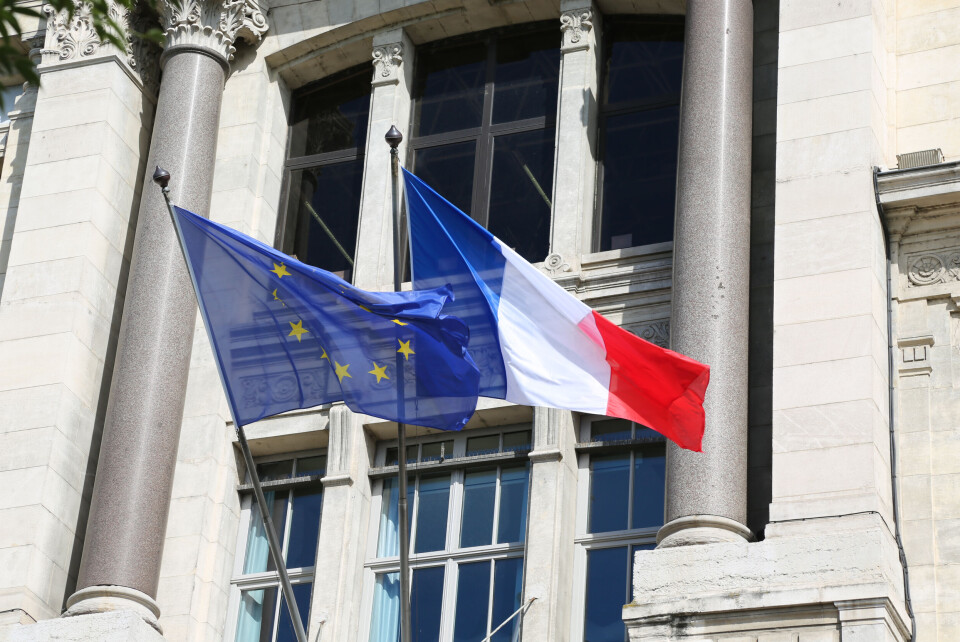-
Comment: Anti-French bravado is an embarrassing British anachronism
Columnist Nabila Ramdani notes that the xenophobic jibes now only appear to go one way
-
Letters: France's wasteful healthcare system needs a rethink
Reader says it would not be fair to ask people to pay more based on their age
-
Letters: The reality of finding a new doctor or dentist in France
Finding a replacement is nigh impossible, says Connexion reader in Lot-et-Garonne
‘Hoisting EU flag as a compulsory sign of peace looks ridiculous’
With war raging in Ukraine, journalist Nabila Ramdani thinks Macron’s new flag policy is personal and trivial

There is a very simple but profound reason why Emmanuel Macron believes in flying the EU flag: Peace in Europe.
I’ve spoken to France’s president personally about this, and he told me that he believes the gold-starred blue banner symbolises the relatively calm 78 years across the western part of the continent since World War Two.
Personal to Macron
This is particularly important to Macron because he is a child of Amiens, capital of the Somme department in northern France and scene of some of the vilest battles in human history.
Combatants from the now self-styled liberal democracies slaughtered each other in their hundreds of thousands using all their industrial might while rallying under national flags, including the French Tricolore and German Reichsflagge, as well as the Union Flag.
Maries to fly Tricolore and EU flag
A united trading bloc led by traditional enemies ended such rivalries, and all but guaranteed peace, Macron argued.
This was especially so after the EU developed into a supranational political union.
Hence, MPs loyal to the president shepherding a new bill through the Paris National Assembly last month imposing the flying of both the national and EU flags on larger town halls.
This means that any mairie serving more than 1,500 local residents will have to go dual banner.
Read more: MPs vote to water down law to make all French mairies fly EU flag
In principle, it is hard to fault Macron’s thinking
He knows that the far-Right, including the Rassemblement National (RN), are furious about the new legislation, but that might be considered a good thing.
Flag-waving nationalism is wonderful at sports events such as football matches, but it can become very sinister indeed when politicians glory in it.
Jean-Marie Le Pen, founder of the RN (as the Front National), was obsessed by the sanctity of the Tricolore, both before and after he was convicted of racism and antisemitism.
EU banner is becoming militaristic
In this sense, the EU flag might well be considered a sign of peace – one that negates the darker aspects of the one it will be fluttering alongside.
Except that a lot has changed in recent years and, for good or bad, the EU banner is fast becoming a militaristic one.
In 2018, just a year after coming to power, Macron himself marked the centenary of the World War One Armistice to say that a “true European army” was needed so the EU could “defend itself better alone”, without the help of America and other NATO allies.
Read more: ‘Superb’, ‘nonsense’: Your views on making French mairies fly EU flag
EU countries pouring weapons into Ukraine
Since then, the perennial Eastern European conflict between Ukraine and Russia has developed into a full-blown war, and the EU is firmly championing the Ukrainians, who are not in the EU.
Ukraine president Volodymyr Zelensky has even just won the hugely prestigious Charlemagne Prize for “services to European unification”.
European Commission president Ursula von der Leyen said during the presenting of the award that “Ukraine incarnates everything the European idea is living for”, while firmly implying that Russia does not.
The vast amount of weapons EU countries are now pouring into Ukraine – Germany pledged €2.7billion-worth in May – certainly backs up such a sentiment.
EU flag no longer sign of peace
Such actions also support the pessimistic prediction that the EU might eventually be dragged into active combat over the future of a non-EU state.
World War Three would likely follow, as other nuclear-armed countries, such as China, ally with the Russians.
It is all almost too terrifying to contemplate, but that is what people were saying in 1913 and 1938.
The issue of national symbols is certainly an absurdly trivial one in relation to the prospect of yet another cataclysmic global war but, given the increasing bellicosity of EU leaders on behalf of Ukraine, hoisting the gold-on-blue flag as a compulsory sign of peace looks like a ridiculous idea.
Related articles
Make flying of EU flag mandatory on all French town halls, say MPs
Leave mairies alone: their role is fundamental to democracy in France
Largest ever Brittany flag displayed in call for more local power
























